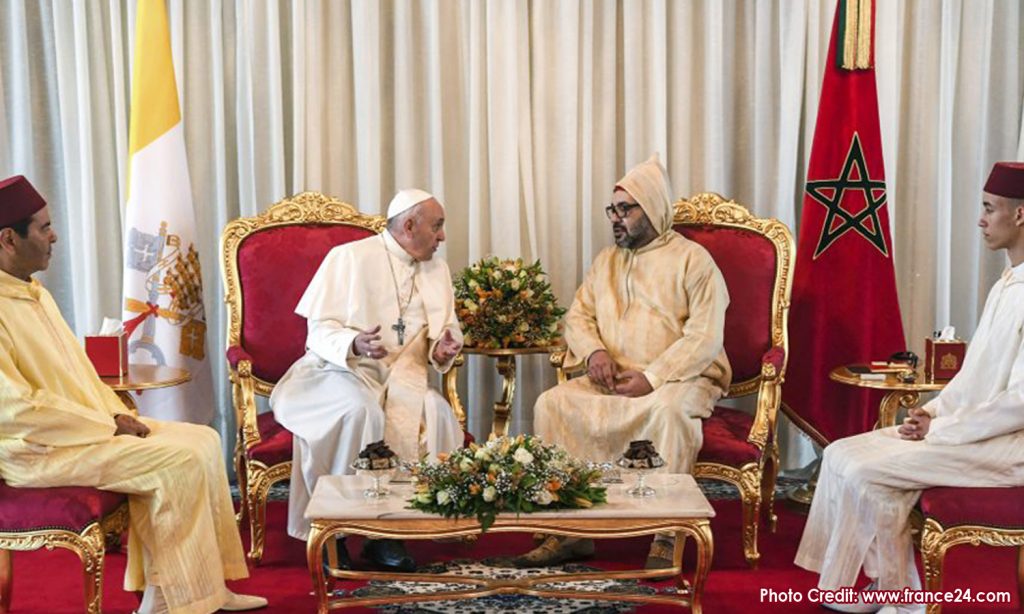(Selected quotations from the original document APOSTOLIC JOURNEY OF HIS HOLINESS POPE FRANCIS TO MOROCCO.)
The Silsilah Dialogue Movement is happy to share with our friends and those who read our Oasis News around the world the message of Pope Francis during his recent visit in Morocco.

As-Salam Alaikum!
…
This visit is for me an occasion of joy and gratitude, for it allows me to see at first hand the richness of your land, your people and your traditions. I am also grateful that my visit offers a significant opportunity for advancing interreligious dialogue and mutual understanding among the followers of our two religions, as we commemorate – at a distance of eight centuries – the historic meeting between Saint Francis of Assisi and Sultan al-Malik al-Kamil. That prophetic event shows that the courage to encounter one another and extend a hand of friendship is a pathway of peace and harmony for humanity, whereas extremism and hatred cause division and destruction. It is my hope that our mutual esteem, respect and cooperation will help strengthen the bonds of sincere friendship, and enable our communities to prepare a better future for coming generations.
In this land, a natural bridge between Africa and Europe, I would like to affirm once more our need for cooperation in giving new impetus to the building of a world of greater solidarity, marked by honest, courageous and indispensable efforts to promote a dialogue respectful of the richness and distinctiveness of each people and every individual. All of us are called to rise to this challenge, especially at the present time, when our differences and our lack of reciprocal knowledge risk being exploited as a cause for conflict and division. If we wish, then, to share in the building a society that is open, fraternal and respectful of differences, it is vital to foster the culture of dialogue and adhere to it unfailingly, to adopt mutual cooperation as our code of conduct and reciprocal understanding as our method and standard (cf. Document on Human Fraternity, Abu Dhabi, 4 February 2019). We are called to pursue this path tirelessly, in the effort to help each other overcome tensions and misunderstandings, clichés and stereotypes that generate fear and opposition. In this way, we will encourage the growth of a fruitful and respectful spirit of cooperation. It is likewise essential that fanaticism and extremism be countered by solidarity on the part of all believers, grounded in the lofty shared values that inspire our actions. For this reason, I am happy that I will shortly visit the Mohammed VI Institute for the Training of Imams, Morchidines and Morchidates. Established by Your Majesty, the Institute seeks to provide effective and sound training to combat all forms of extremism, which so often lead to violence and terrorism, and which, in any event, constitute an offense against religion and against God himself. We know how important it is to provide a suitable preparation for future religious leaders, if we wish to awaken a genuinely religious spirit in the heart of future generations. Authentic dialogue, then, makes us appreciate more fully the importance of religion for building bridges between people and successfully meeting the challenges that I mentioned above. While respecting our differences, faith in God leads us to acknowledge the eminent dignity of each human being, as well as his or her inalienable rights. We believe that God created human beings equal in rights, duties and dignity, and he calls them to live as brothers and sisters and to spread the values of goodness, love and peace. That is why freedom of conscience and religious freedom – which is not limited to freedom of worship alone, but allows all to live in accordance with their religious convictions – are inseparably linked to human dignity. In this regard, there is a constant need to progress beyond mere tolerance to respect and esteem for others. This entails encountering and accepting others in their distinctive religious beliefs and enriching one another through our diversity, in a relationship marked by good will and by the pursuit of ways we can work together. Understood in this way, creating bridges between people – from the point of view of interreligious dialogue – calls for a spirit of mutual regard, friendship and indeed fraternity.
We hope that this and many other “encounters of dialogue” will help to create in the world a new Culture of Dialogue as a Path to Peace.

